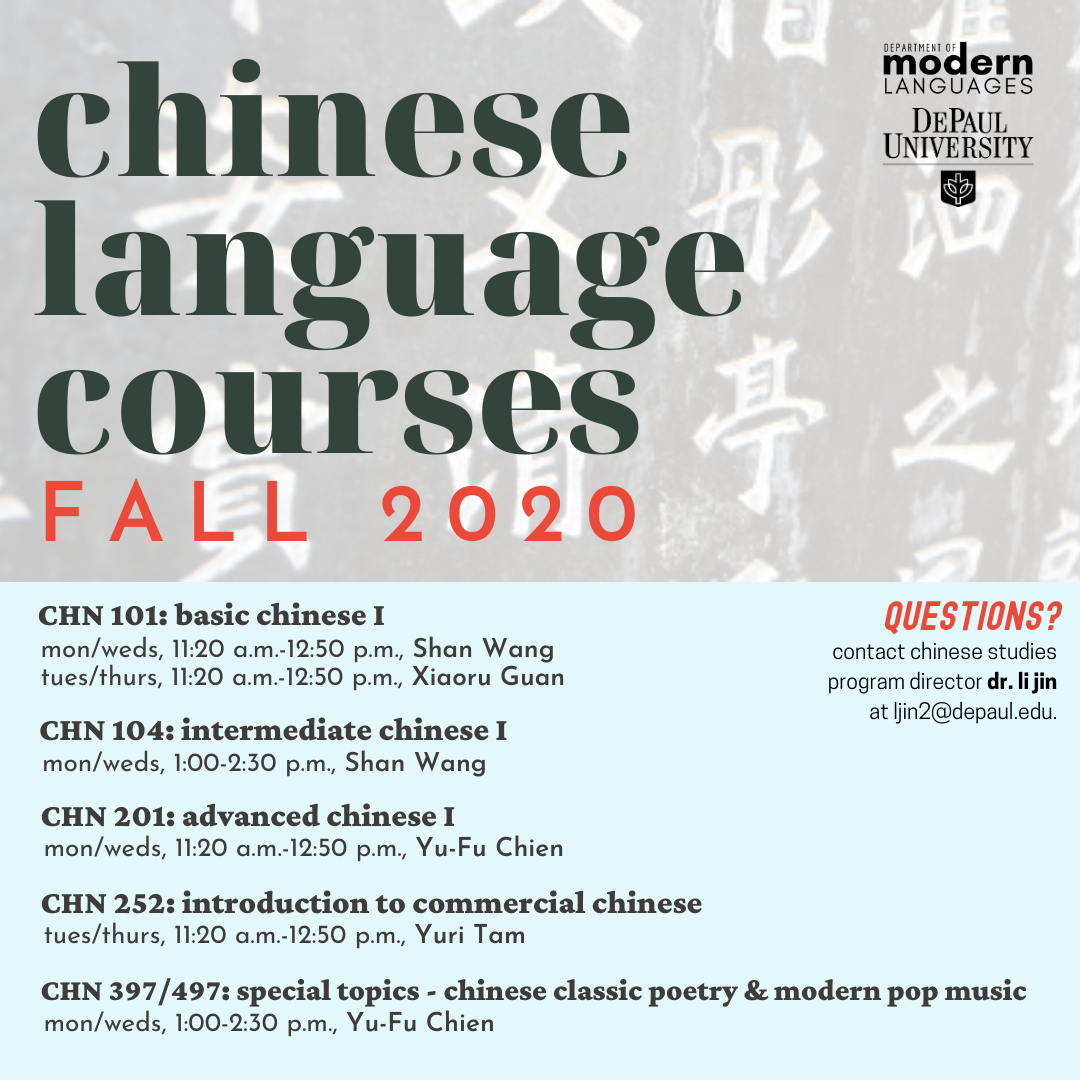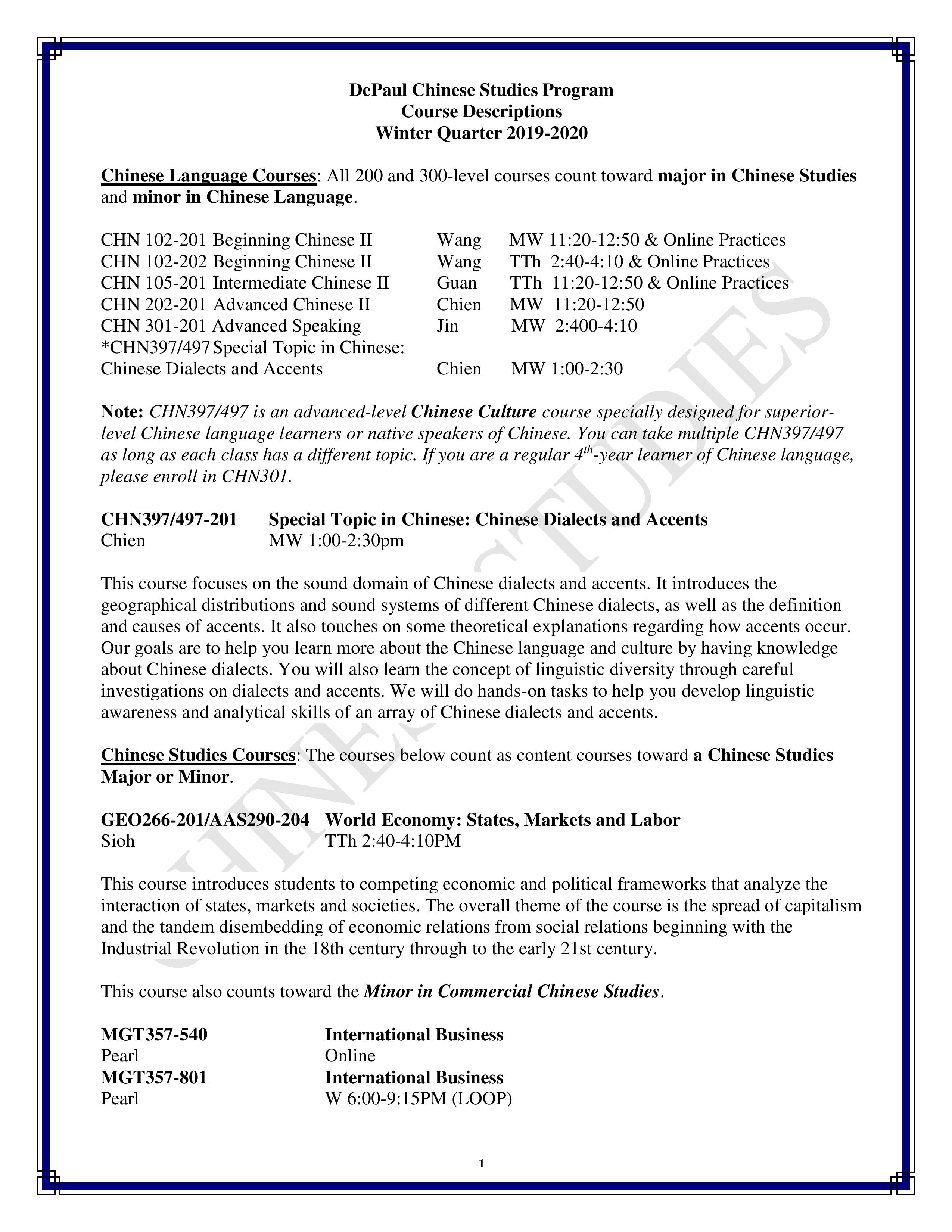Category: News
Mandarin Chinese/English Bilingual Job


Chinese Studies Program Course Offerings: Autumn 2020


Chinese Studies Program Course Offerings: Spring Quarter 2020



Alumna: Michaela Milligan (马文君) (2016-2020)

Q1: WHY DID YOU CHOOSE TO MAJOR IN CHINESE STUDIES AT DEPAUL UNIVERSITY?
I started studying Mandarin when I was about 13 and continued with my studies into university. When I was trying to decide where to transfer to I was between the program at DePaul and the program at Indiana University, both very good programs. I was working in Chinatown at the time and decided to ask my boss for her advice — she suggested to me that DePaul was the best choice and noted she had personally hired many students from DePaul’s Chinese Studies program. To me this says two things 1) that the program at DePaul was very successful at placing students into work opportunities in their field of study and that 2) the DePaul program had a good reputation among employers. For me, finishing my degree was first and foremost about being able to find rewarding and interesting employment after graduation. In my time here I’ve felt very empowered by the ability to network and become professionally engage as a student, so I’m very happy to say I clearly made the right choice for me.
Q2: WHAT WERE THE SIGNIFICANT EVENTS THAT SHAPED YOU DURING YOUR DEPAUL YEARS? HOW?
The most significant things about my DePaul education have certainly been the abundant access to resources …
Our Chinese Studies Program maintains a relationship with the Chinese Consulate office allowing for students to benefit from fully-funded year and semester long exchanges at Chinese universities. In 2018, I had the opportunity to spend six months at Sun Yat-Sen University in Guangzhou (one of the top 10 schools in China). This was a great opportunity, not only for me to study in China and improve my language skills but was also pivotal to the evolution and development of my research interests. Prior to applying to SYSU I had worked several jobs and internships in Chinatown and was drawn to Guangzhou for its connection to Chinese-American history. I wanted to learn Cantonese while I was there, and I’m happy to report that I can now order dim-sum, buy fruit, and say a few other basic phrases in Cantonese. At the same time, by keeping myself open to new opportunities and experiences I became involved in the community of foreigners from Africa, the Middle East, and South Asia living in Xiaobei, Guangzhou. Through this I have developed research interests around transnationalism, network building, and meaning making among foreigners in Southern China.
Beyond this resource my path has been shaped by the many other resources available to me from the college, department, and program. Including the LAS CPBL scholarship, and networking events.
Q3: WHAT IS YOUR FUTURE PLAN?
I’ve started working as a Collections Assistant at the Chinese American Museum of Chicago. This spring I will be attending the FACES conference at Beijing University, a follow up to the first half of the conference held this past October at Stanford University. At the same time, I am waiting to hear back on a number of other opportunities. I want to work in my field as much as possible for the next few years to better develop my interests, and spend more time living in China. I am particularly interested in opportunities to write about China in ways that are thorough, balanced, and engaging, something that I feel is not particularly available to the general American public but is very much needed as citizens take a greater interest in China and its role in the world. After that I intend to apply for graduate programs in Anthropology, researching China.
Q4: WHAT ADVICE CAN YOU GIVE CURRENT STUDENTS IN THE DEPAUL CHINESE STUDIES PROGRAM IN TERMS OF THEIR ACADEMIC LIFE?
Just show up. Just apply. Just give it a shot. Really, a lot of times it is as easy as just showing up for things. Many of the opportunities I’ve learned about, or helpful people I’ve met, I’ve met simply by showing up to events and staying around after to talk to people. It sounds like simple advice but there have been times that I’ve been the only one to show up to an event, or the only one to apply to something and then that puts you a head above everyone else. That really begins to build after time.
The other important thing to do is plan: Set a major goal for yourself, a scholarship, a graduate program, a certain job, and then research what people who have done that thing did before they were there. Use that as a road map and then look for what kind of building block opportunities you can work toward in between here and there. Plan it out year by year or quarter by quarter, make a spreadsheet, or a document, or a list in your head but make a plan with all the steps you want to take to achieve the goals you’ve set for yourself. Even if you don’t end up getting the job or program you were hoping for you will have still done the steps in between and they will help you grow and develop your interests and network.
Chinese Studies Program Course Offerings in December Session 2019 and Winter Quarter 2020
The following course to be offered in December session, 2019 counts toward the major and minor in Chinese Studies:
HAA220/AAS211 Buddhist Art
Hansman M 12:00-15:15 ( December 2-20, 2019)
This course also meets the Arts and Literature (AL) liberal studies domain requirement.



Autumn 2019 Chinese Studies Course Offerings



2018 CHINA Town Hall (Oct 9, 2018)
Please join us for an exciting event! RSVP: https://dpuchinatownhall.eventbrite.com

Chinese Studies Course Offerings in Winter Quarter 2019



DePaul Chinese Language Curriculum Map
Any students interested in learning Chinese language at DePaul University, please check the following curriculum map to see what course you need to take each quarter according to your proficiency level. If you start from the beginning-level classes, please follow the appropriate sequence to complete all CHN course requirements of your degree.


